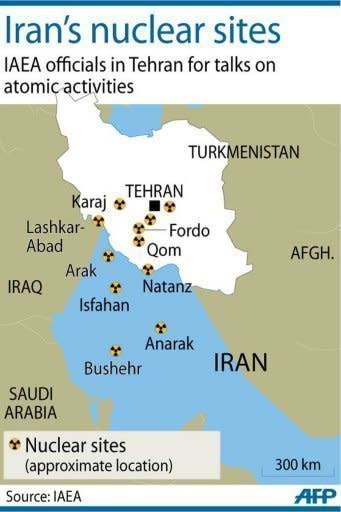Iran downplays UN find, media wary of Moscow talks
Iran on Saturday downplayed a report by the UN atomic watchdog that uranium traces have been detected of a higher grade than any found before, as media voiced doubts about the next round of talks on Tehran's nuclear programme. Higher than expected traces of enriched uranium "are a normal technical issue that is being investigated by (IAEA) experts," Iran's envoy to the International Atomic Energy Agency Ali Asghar Soltanieh was quoted as telling the official IRNA news agency. The agency report said that the traces found at the Fordo site, inside a mountain bunker near Qom, were of uranium enriched to purities of 27 percent. Previously, the highest level recorded by the agency in Iran was 20 percent. The West fears that Iran could be covertly aiming to enrich uranium towards the 90 percent needed to develop atomic bombs, a claim Tehran vehemently denies. "Addressing technical and trivial issues, which also occur in the nuclear facilities of other nations, show media reports are seeking political goals," Soltaneih said. "Highlighting and politicising a technical issue is a sign of efforts to damage the atmosphere of constructive cooperation between Iran and the agency," he added. Soltanieh said the report "is more proof of the peaceful nature of Iran's nuclear activities and of our country's success in the field of nuclear technology, in particular enrichment, and its full cooperation with the agency." Iran's atomic chief Fereydoon Abbasi Davani urged IAEA head Yukiya Amano not to report such issues "while we are currently discussing (other) issues." "We can enrich in higher purities since these machines have the capabilities. If technical glitches occur it can be discovered that it was an error. The issue of 27 percent enriched uranium is not a special issue to be converted into conflict," Abbasi Davani was quoted by the ISNA news agency as saying. Analysts cautioned that the 27-percent find could just be a processing glitch and not necessarily a sign of a deliberate effort to enrich above 20 percent. In the IAEA report, which was seen by AFP, Iran also explained that enrichment above 20 percent "may happen for technical reasons beyond the operator's control." The report said the IAEA was "assessing Iran's explanation and has requested further details." Early this month it took samples from the site that were being analysed. The report was published a day after Iran ended two days of crunch talks in Baghdad with world powers over its disputed nuclear drive. Little was achieved except scheduling another meeting in Moscow for June 18-19 and establishing that they are poles apart on crucial issues. Iranian media on Saturday expressed pessimism about the Moscow talks after this week's negotiations, which one newspaper described as "fruitless." "Solution: stop the negotiations," ran the headline of an editorial in the hardline Kayhan daily. "It is better not to attend the talks because one can expect right now that the talks in Moscow will not gain any achievement either," said the newspaper's managing director Hossein Shariatmadari, who was appointed by supreme leader Ayatollah Ali Khamenei. It was the world powers who needed to keep the talks going so "they can control the oil prices," he added. "Nuclear talks in Baghdad ended fruitless," the conservative Jomhuri Eslami newspaper announced, with an editorial pinning the failure of talks on Israel and its demands allegedly conveyed by representatives of the P5+1 powers -- the United States, Russia, China, Britain, France and Germany. Israel, the sole if undeclared nuclear-armed state in the Middle East, accuses Iran of masking efforts to acquire an atomic weapon. It wants the Islamic republic to dismantle its Fordo nuclear site. "The deadlock will be resolved when the West breaks the Zionist regime's dominance. Until then Iran cannot hope for any change" in the Western approach, Jomhuri Eslami said. The governmental newspaper Iran said the talks suggested that the West was not seeking a resolution to the nuclear standoff. The reformist Etemad daily in its editorial suggested that for the talks to succeed in Moscow, sanctions should be lifted and military threats taken off the table.



